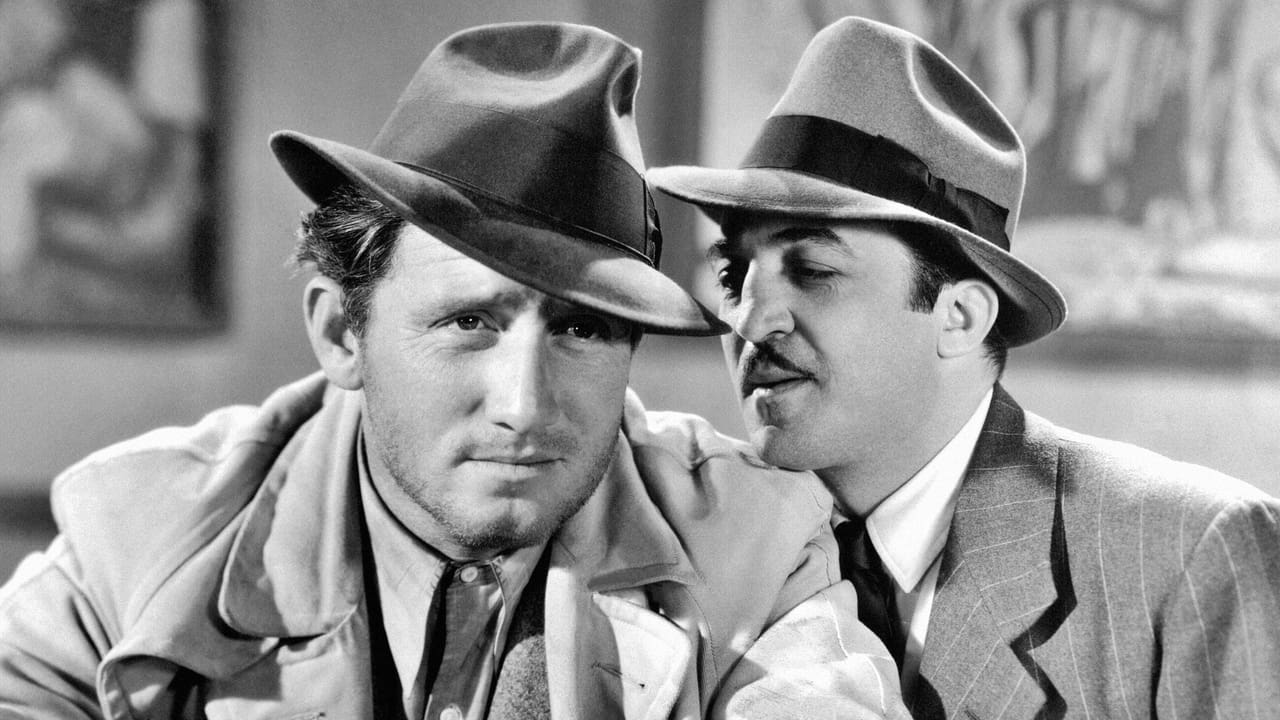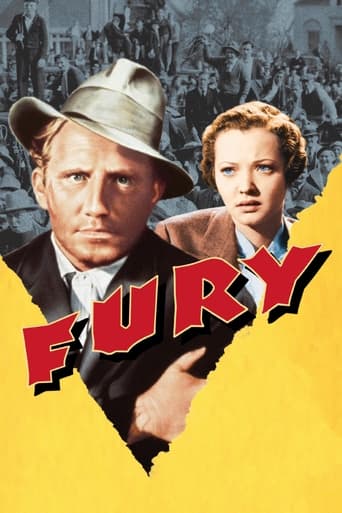

This Movie Can Only Be Described With One Word.
... View MorePlease don't spend money on this.
... View MoreThe movie is wonderful and true, an act of love in all its contradictions and complexity
... View MoreThis is a dark and sometimes deeply uncomfortable drama
... View MoreThis really showed what Spencer Tracy was all about. Since the studio wouldn't deal with the usual victim of a lynching, they use Tracy as an everyman who gets put in jail on flimsy evidence over the kidnapping of a young woman. When the town gets wind of this, they escalate into a mob, burning down the jail with him in it. Fortunately for him, a couple sticks of dynamite thrown into the flames blows the door off the jail and Tracy escapes. Now that it is assumed that he is dead, he enlists family members to help him and an unwitting district attorney to try the men and women responsible. They are convicted of murder, even though there is no body. This is a suspenseful film from beginning to end under the capable hands of Fritz Lang. We are able to feel the incredible shame and regret that the principles feel, but we are also allowed to experience the awful event Tracy's character had to endure. Of course, how many trials in the South (and the North at times) allowed the members of a mob to get away with horrible acts, usually against Blacks. I had not heard of this film and am pleased I saw it.
... View MoreThere isn't Much going on in this Small Town so when there is a Celebrity Suspect Caught in a Widely Known Kidnapping Case the Citizens Spiral out of Control in Their Dimwitted Zeal and Decide to Unleash some Mob Justice.A Towny Leaps on a Table in a Bar and Shouts..."Let's go have a little fun!"So with Ropes and Self-Righteousness on Their side its off to the Jail and a Burning, Bombing, "Lynching", takes place. In this Odd Film from MGM (they had absolutely no confidence in it), Director Fritz Lang Begins in America with His Display of Social Commentary. Something the Studio Usually Shunned.Spencer Tracy is Fine as a "Jekyll and Hyde" Everyman and Sydney Sylvia has an Expressive Face with Deep Concern and Exudes Empathy. Lang is a Stylist and here He Manages some Expressionistic Shots that Add to the Odd Feel of the Film. The Good Cast is Cloaked in Melodrama and the Movie is a Dark, Artistic Display of Depression Era Desperation and Bad Behavior.It's a Scathing Indictment of Unconstitutionality and the Populace Running Amok. A Barber says..."I had to read the Constitution to become a Citizen...you didn't have to because you were born here."The Film is Dense in its Societal Concerns as the Country was Experiencing the Pains of the Depression and the World was Waiting for War. They didn't have to Wait Long and Lang Knew what was Coming and was Determined to Shout Out to Anyone who would Listen, Using His Symbolic Sensibilities and a Flare for the Dramatic.Overall, it is a Movie that is Thought Provoking through the Lens of Lang and Predicted the Use of Electronic Surveillance Footage to Convict Criminals. Fritz Lang's Films were Almost Always Ahead of Their Time and the Director was Forever Pushing it to the Limit with more Artistry then Believability and that was part of His Appeal as an Auteur.
... View More"Fury" was a hard hitting story about mob violence and not the sort of film usually associated with MGM. Metro was extremely uneasy about what to do with the movie - first they were going to release it, without any publicity as part of a double bill (can you imagine it!!). Then after the editor of "The Hollywood Reporter" caught it and spoke favourably about it, MGM was forced to release it in a first run New York theatre - but they still had no faith in it. Even though it didn't set box offices on fire, everyone connected with it - MGM, Fritz Lang, Spencer Tracy and Sylvia Sidney garnered accolades and prestige. Taken from a story called "Mob Rule' by Norman Krasna, who found inspiration in the real life incident of two kidnap killers who fell victim to vigilante justice in San Jose, California."Fury" begins by detailing the tribulations of Joe Wilson (Spencer Tracy), garage man and his fiancée, teacher Katherine (Sylvia Sidney). After a year of separation, they finally see their way to marriage and Joe drives south to meet Katharine at a designated diner. When Joe is stopped by a police road block, what seems to be a case of mistaken identity (he fits the description of a child kidnapper - especially Joe's love of salted peanuts), snowballs, when through small town gossip, an angry lynch mob gathers at the jail. Rushing the jail, the mob set it on fire while Katherine, who has literally ran to the town after learning of his arrest, looks on in horror.Sylvia Sidney was the one actress who could match the intensity of Spencer Tracy and she has several fine scenes - especially in the court. Joe did not perish in the fire but escaped, but only makes himself known to his brothers (Frank Albertson and George Walcott). Behind his cloak of invisibility, he controls proceedings, forcing them to put the 22 rabble rousers on trial for murder. Katherine, believing Joe is dead, is to testify - but in the elevator she recognises the coat that Tom is wearing - it is the same one she patched for Joe the night they parted. Sidney's scenes in court, where she has to testify on oath that she saw Joe die - even though she now realises that he is alive, are possibly the most compelling she has ever performed. In my opinion, this is one of Tracy's best performances but Sylvia is right up there with him. Tracy's acting only served to strengthen his new found position at MGM. Even though many at the time were disappointed with the Hollywood style ending, I liked it. And the look on Bruce Cabot's face when Tracy calmly walks into court is priceless!!!Highly, Highly Recommended.
... View More"Fury", Fritz Lang's first American film, is a story of revenge told from a couple of different viewpoints. The film examines mob justice and also how obsession over revenge can be more damaging than the original injustice.The always reliable Spencer Tracy plays Joe Wilson, a law-abiding citizen in the wrong place at the wrong time. After he's imprisoned for suspected links to a kidnapping case rumours begin to run rampant. Soon the so-called upstanding citizens of the town decide to take matters into their own hands. Their lynching attempt seemingly succeeds but Wilson survives and hatches a plot to send 22 people to the gallows for his apparent murder.The story is thought-provoking since it presents two sides of the supposed justice of revenge. On one hand we have the group mentality that leads to mob justice and on the other we have the fury of a wrongly persecuted man who isn't satisfied with an eye for an eye and instead wants two eyes (or in this case, 22). The screenwriters' deft use of this material resulted in a well-deserved Oscar nomination.Besides the aforementioned Spencer Tracy, the film features Sylvia Sidney in the lead female role. She didn't impress me as much as Tracy but her character is indispensable to the film. The supporting cast is stocked with capable character actors like Walter Brennan, Walter Abel & Edward Ellis, giving the film a solid foundation to build from.Lang's direction is eye-catching, the cinematography is crisp and the film is briskly edited. Franz Waxman's score ably supports the action without drawing attention to itself.All in all, "Fury" is a quality crime film that deserves to be better known. There's a bit of a feeling that studio interference may have softened the film's tone a little but what's on the screen makes for a compelling, thought-provoking crime drama.
... View More